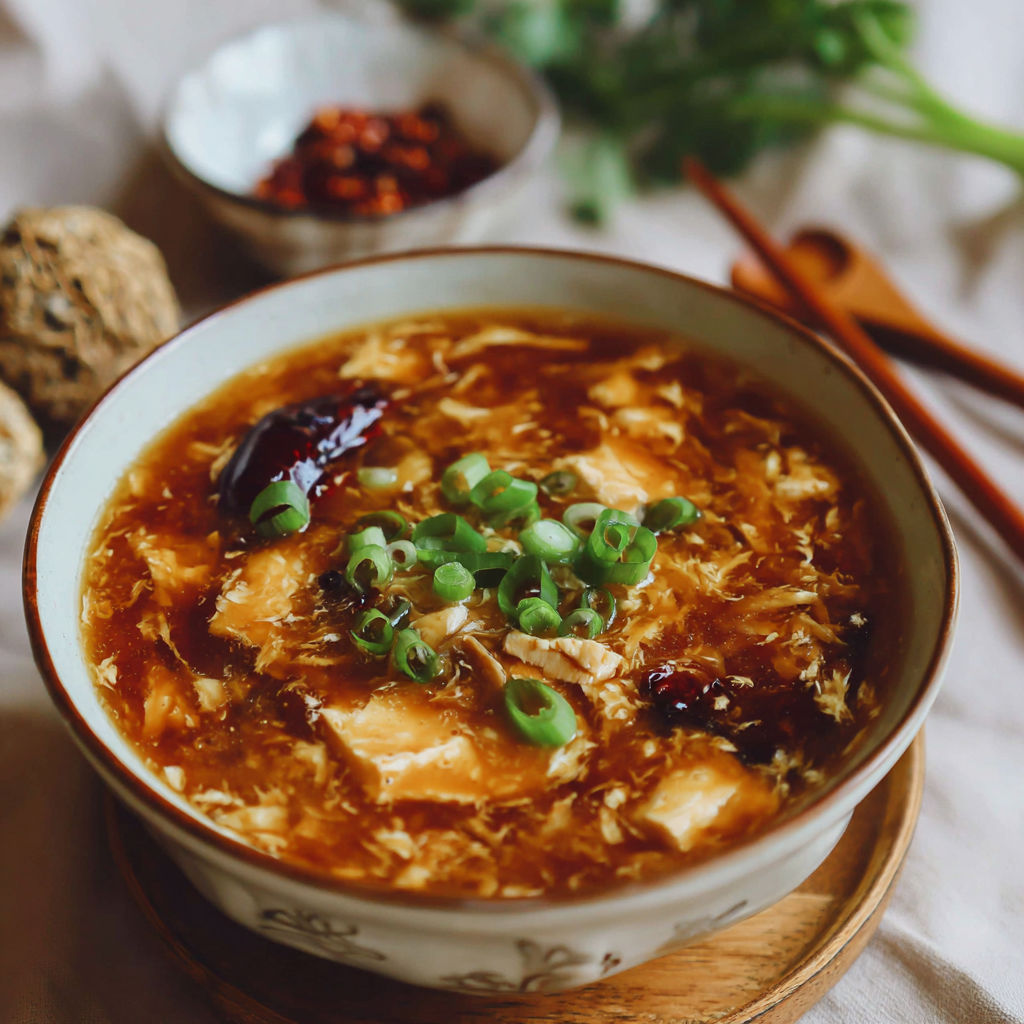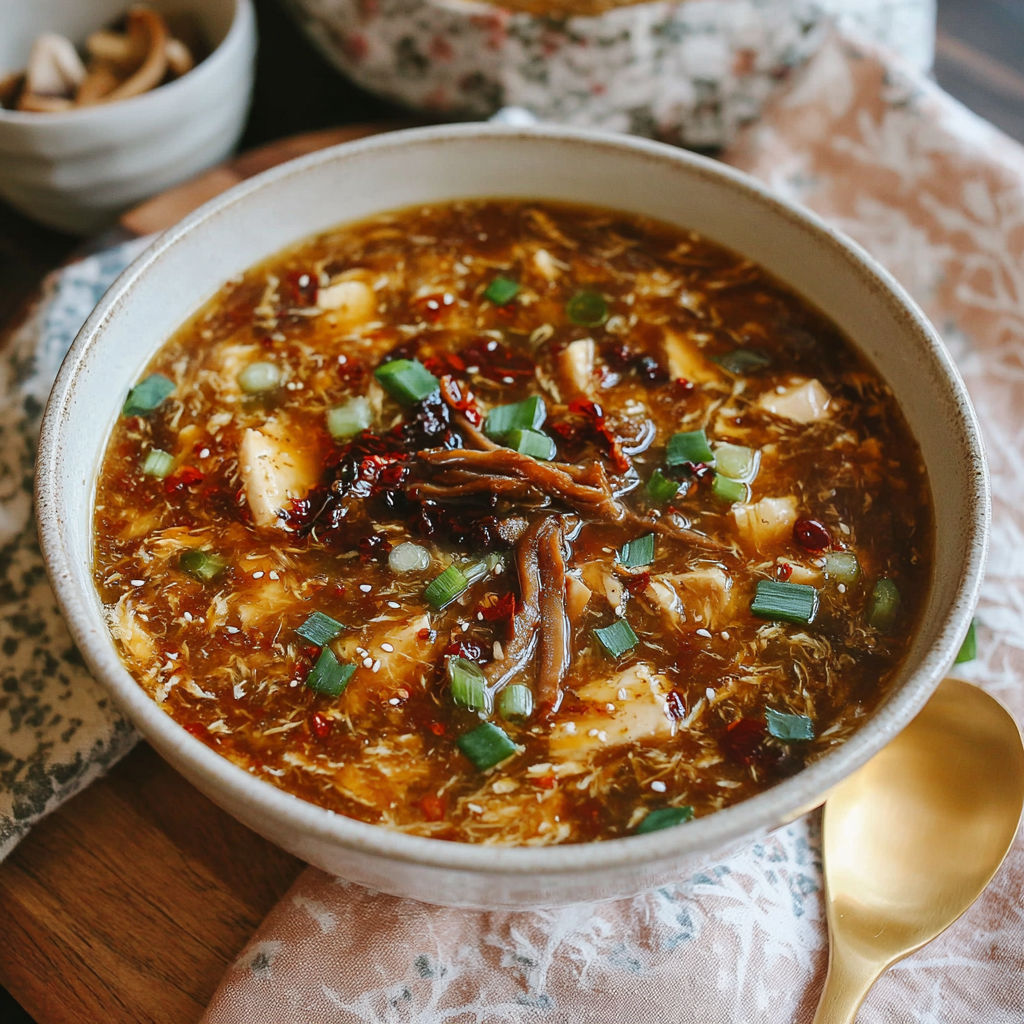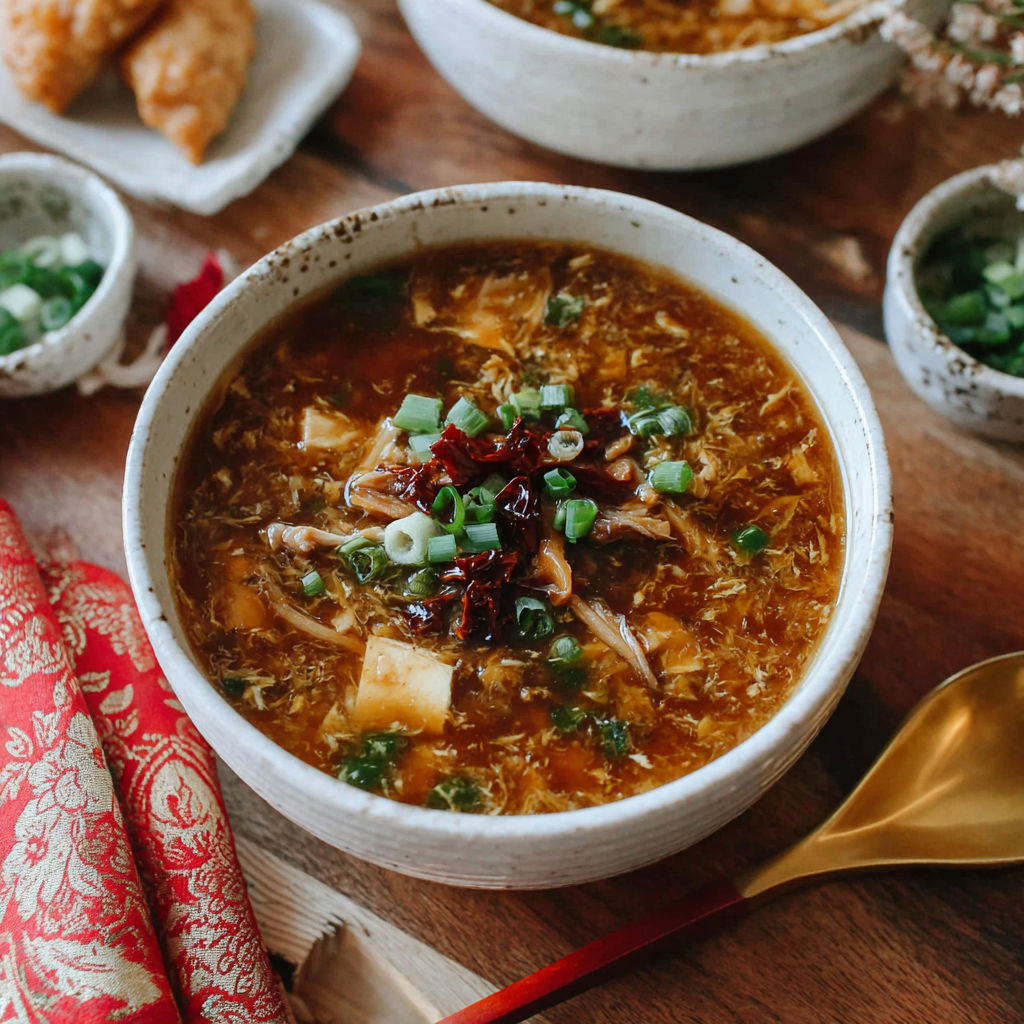 Save
Save
This hot and sour soup is a treasured recipe passed down from my grandfather who owned a Chinese takeout restaurant after immigrating to the U.S. It truly is the best hot and sour soup I have ever tasted and has become a comfort dish that reminds me of family gatherings and simple meals packed with bold flavors.
I first made this soup while trying to recreate my grandfather’s takeout flavors and now it’s a regular in my kitchen, especially on chilly evenings when I crave something both warming and bright.
Gather Your Ingredients
- Pork shoulder finely julienned: provides tender meat and umami richness, aim for fresh and nicely marbled cuts
- Dried red chili peppers: add variable heat, remove seeds to control spiciness
- Dried lily flowers: unique floral notes and texture, rehydrate fully for best mouthfeel
- Dried wood ear mushrooms: offer a pleasant crunch, ensure they are clean and well soaked
- Dried shiitake mushrooms: give smokiness and depth, look for firm dried caps
- Spiced dry tofu: adds savory complexity, pick firm tofu with good bite
- Fresh firm tofu: softens the texture contrast, choose fresh and wrinkle-free
- Bamboo shoots: contribute crispness and mild sweetness, canned is fine if fresh not available
- Large egg: enriches soup with silky ribbons when added last
- Scallion finely diced: for a fresh garnish and mild onion flavor
- Low sodium chicken stock: base broth, low salt lets you control final seasoning
- Salt and sugar: balance flavors, adjust to taste
- White pepper freshly ground: signature heat with a mild sharpness
- Dark soy or mushroom soy sauce: deep savory notes, use quality dark soy for richness
- Light soy or seasoned soy sauce: brightness and salt, opt for naturally brewed soy sauce
- Sesame oil: imparts a fragrant nutty aroma, use sparingly for best effect
- White vinegar: key sour component, adjust according to preference
- Cornstarch and water slurry: thickens soup smoothly without lumps
How to Make It
- Prepare the Pork:
- Combine the julienned pork shoulder with one tablespoon of water and let the meat absorb it fully. Add a pinch of salt, two teaspoons of vegetable oil, and one teaspoon of cornstarch. Mix everything until the pork is evenly coated. Set this aside to marinate while you prepare the other ingredients.
- Soak and Prepare the Dry Ingredients:
- Cut the dried chili peppers in half and remove the seeds to moderate the heat. Mince them finely and set aside. Soak the dried lily flowers, dried wood ear mushrooms, and dried shiitake mushrooms each in a separate bowl filled with one cup of water. Use hot water to speed up the process, but allow at least one hour for full rehydration. Once softened, thinly slice the mushrooms, roughly chop the wood ears, trim tough ends from the lily flowers and cut them in half.
- Prepare Tofu and Bamboo Shoots:
- Cut both the spiced dry tofu and the fresh firm tofu into pieces about two inches long and one quarter inch thick. Julienne the bamboo shoots. Beat the egg in a small bowl and finely chop the scallion for garnish.
- Assemble the Soup:
- Bring eight cups of low sodium chicken stock to a rolling boil in a wok or pot. If your pork has clumped together, add an extra tablespoon of water to loosen before stirring it into the hot stock. Break up any pork clumps quickly and let the soup return to a simmer. Use a fine mesh strainer to skim off any foam that rises to keep the broth clear.
- Season the Broth:
- Add half a teaspoon of salt, a quarter teaspoon of sugar, the minced dried chilies if using, one to two teaspoons of freshly ground white pepper, two teaspoons of dark soy or mushroom soy sauce, one tablespoon of light soy sauce, and one teaspoon of sesame oil. Stir well to blend these aromatics.
- Add Vegetables and Simmer:
- Introduce the lily flowers, wood ear mushrooms, shiitake mushrooms, and bamboo shoots. Bring the soup back to a gentle simmer.
- Incorporate Tofu and Vinegar:
- Gently add the two kinds of tofu and stir in one third to one half cup of white vinegar gradually. You should start to smell and see the signature hot and sour character develop.
- Make the Cornstarch Slurry:
- Combine one third cup of cornstarch and one quarter cup of water thoroughly to make a smooth slurry, ensuring no lumps remain.
- Thicken the Soup:
- Bring the soup to a simmer again and stir it in a steady circular motion creating a whirlpool. Slowly pour the cornstarch slurry while continuing to stir. Stop when about three quarters of the slurry is added and wait for the soup to come back to a simmer. Check thickness. If you desire a thicker consistency, add the rest of the slurry.
- Adjust Final Seasoning:
- Taste the soup and make adjustments. Add more white pepper if you want extra heat or increase vinegar for additional sourness. These two ingredients define the character of hot and sour soup.
- Add the Egg:
- Keep the soup bubbling gently and stir in a circular motion once more. Slowly drizzle in the beaten egg, allowing it to form silky ribbons as it cooks in the hot broth.
- Serve:
- Ladle the hot and sour soup into bowls and garnish generously with chopped scallions.

My favorite ingredient has to be the dried shiitake mushrooms. They bring a smoky depth that transforms the soup from ordinary to extraordinary. I often think back to my grandfather carefully preparing these mushrooms and the pride he took in perfecting this recipe. It always makes the meal feel that much more special.
Flavor Boosters
Storage Tips Store leftovers in an airtight container in the refrigerator for up to three days. Reheat gently on the stove, stirring occasionally to prevent the tofu from breaking down too much. Avoid microwaving if possible to maintain better texture. Ingredient Substitutions If you cannot find dried lily flowers, you can omit them or substitute with thin slices of fresh asparagus for a textural contrast. For the dried wood ear mushrooms, fresh black fungus can be used. Use regular tofu instead of spiced dry tofu if unavailable, but consider adding a dash of Chinese five-spice powder to mimic flavor.
Serving Suggestions
Serve hot and sour soup as a starter or paired with fried rice and stir-fried vegetables for a complete meal. A side of crispy spring rolls or steamed dumplings complements the flavors well. Garnish with extra sliced scallions or fresh cilantro for brightness.
Creative Twists
Cultural Context Hot and sour soup is a classic in Chinese cuisine, beloved for its balance of heat and tanginess. It represents culinary harmony, where contrasting flavors come together beautifully. Traditionally, it was served in Chinese restaurants across America and remains a nostalgic comfort food for many families. Seasonal Adaptations In warmer months, lighten the soup by reducing pork and increasing fresh vegetables like snow peas or baby corn. For a heartier winter version, add additional mushrooms or switch chicken stock to a rich pork bone broth for extra depth and warmth. Success Stories Many friends who have tried this recipe say it tastes just like the takeout they grew up with and appreciate how it is made from scratch without preservatives. It is often requested at holiday dinners and potlucks. Freezer Meal Conversion This soup can be frozen but be mindful that the tofu texture might soften after thawing. Freeze in portioned containers with extra broth to adjust thickness upon reheating.

This recipe is a wonderful balance of tradition and flavor that warms the soul while delighting the palate.
Recipe FAQs
- → What ingredients provide the sour flavor?
White vinegar adds the distinctive sour note that balances the heat in the soup.
- → How is the soup thickened?
A cornstarch slurry mixed with water is slowly added to create a smooth, thickened broth.
- → What mushrooms are used in this dish?
Dried shiitake, wood ear mushrooms, and dried lily flowers are rehydrated and added for texture and earthiness.
- → How is the spicy heat achieved?
Dried red chili peppers and freshly ground white pepper lend the soup its characteristic heat.
- → What proteins are included?
Julienned pork shoulder and a mix of spiced and firm tofu provide tender and flavorful protein components.
- → Why is the egg added slowly?
Beaten egg is drizzled in while stirring to create delicate ribbons, enhancing texture without clouding the broth.
